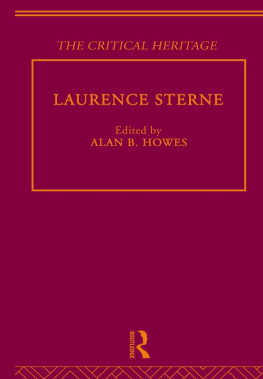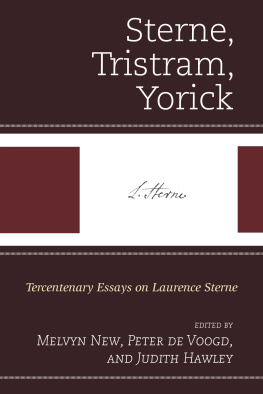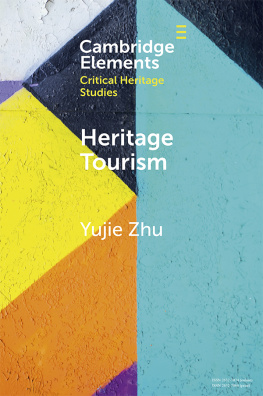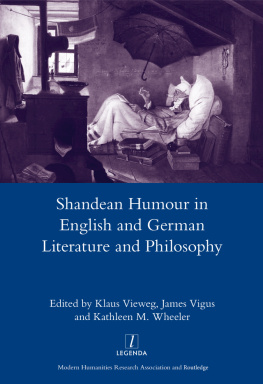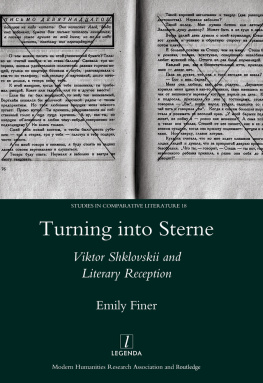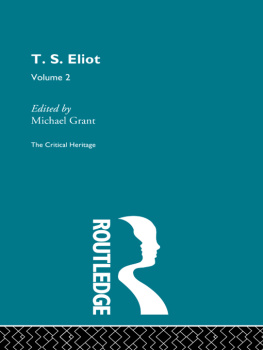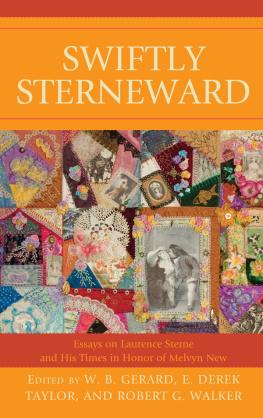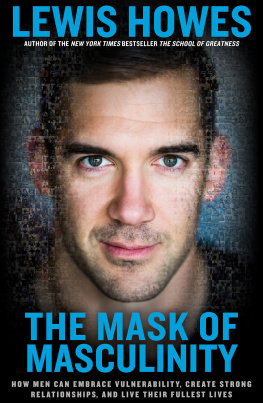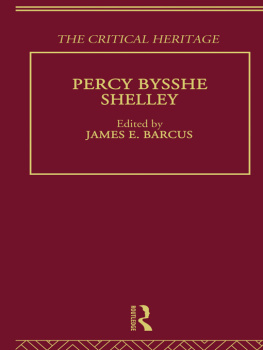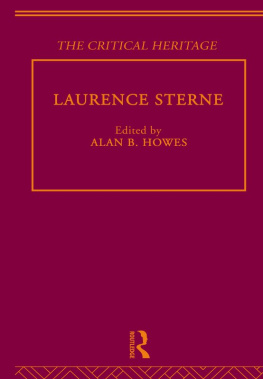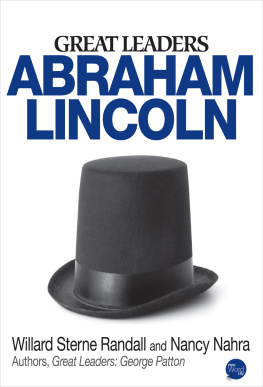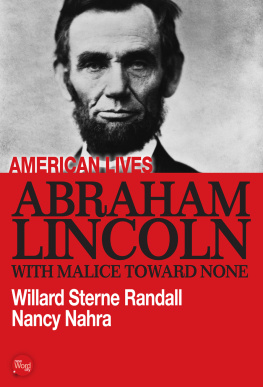Howes Alan B. - Laurence Sterne: the critical heritage
Here you can read online Howes Alan B. - Laurence Sterne: the critical heritage full text of the book (entire story) in english for free. Download pdf and epub, get meaning, cover and reviews about this ebook. City: London;New York, year: 2016;1995, publisher: Routledge, genre: Detective and thriller. Description of the work, (preface) as well as reviews are available. Best literature library LitArk.com created for fans of good reading and offers a wide selection of genres:
Romance novel
Science fiction
Adventure
Detective
Science
History
Home and family
Prose
Art
Politics
Computer
Non-fiction
Religion
Business
Children
Humor
Choose a favorite category and find really read worthwhile books. Enjoy immersion in the world of imagination, feel the emotions of the characters or learn something new for yourself, make an fascinating discovery.
- Book:Laurence Sterne: the critical heritage
- Author:
- Publisher:Routledge
- Genre:
- Year:2016;1995
- City:London;New York
- Rating:4 / 5
- Favourites:Add to favourites
- Your mark:
- 80
- 1
- 2
- 3
- 4
- 5
Laurence Sterne: the critical heritage: summary, description and annotation
We offer to read an annotation, description, summary or preface (depends on what the author of the book "Laurence Sterne: the critical heritage" wrote himself). If you haven't found the necessary information about the book — write in the comments, we will try to find it.
Laurence Sterne: the critical heritage — read online for free the complete book (whole text) full work
Below is the text of the book, divided by pages. System saving the place of the last page read, allows you to conveniently read the book "Laurence Sterne: the critical heritage" online for free, without having to search again every time where you left off. Put a bookmark, and you can go to the page where you finished reading at any time.
Font size:
Interval:
Bookmark:
General Editor: B. C. Southam
The Critical Heritage series collects together a large body of criticism on major figures in literature. Each volume presents the contemporary responses to a particular writer, enabling the student to follow the formation of critical attitudes to the writer's work and its place within a literary tradition.
The carefully selected sources range from landmark essays in the history of criticism to fragments of contemporary opinion and little published documentary material, such as letters and diaries.
Significant pieces of criticism from later periods are also included in order to demonstrate fluctuations in reputation following the writer's death.
LAURENCE STERNE
THE CRITICAL HERITAGE
Edited by
ALAN B. HOWES

First published 1971
Reprinted in 1995 by Routledge
11 New Fetter Lane
London EC4P4EE
&
29 West 35th Street
New York, NY10001
Compliation, introduction, notes and index 1971 Alan B. Howes
Printed in Great Britain by
TJ Press, Padstow, Cornwall
All rights reserved. No part of this book may be reprinted or reproduced or utilized in any form or by any electronic, mechanical, or other means, now known or hereafter invented, including photocopying and recording, or in any information storage or retrieval system, without permission in writing from the publishers.
British Library Cataloguing in Publication Data
ISBN 0-415-13425-0
The reception given to a writer by his contemporaries and near-contemporaries is evidence of considerable value to the student of literature. On one side we learn a great deal about the state of criticism at large and in particular about the development of critical attitudes towards a single writer; at the same time, through private comments in letters, journals or marginalia, we gain an insight upon the tastes and literary thought of individual readers of the period. Evidence of this kind helps us to understand the writer's historical situation, the nature of his immediate reading-public, and his response to these pressures.
The separate volumes in the Critical Heritage Series present a record of this early criticism. Clearly, for many of the highly productive and lengthily reviewed nineteenth- and twentieth-century writers, there exists an enormous body of material; and in these cases the volume editors have made a selection of the most important views, significant for their intrinsic critical worth or for their representative quality perhaps even registering incomprehension!
For earlier writers, notably pre-eighteenth century, the materials are much scarcer and the historical period has been extended, sometimes far beyond the writer's lifetime, in order to show the inception and growth of critical views which were initially slow to appear.
In each volume the documents are headed by an Introduction, discussing the material assembled and relating the early stages of the author's reception to what we have come to identify as the critical tradition. The volumes will make available much material which would otherwise be difficult of access and it is hoped that the modern reader will be thereby helped towards an informed understanding of the ways in which literature has been read and judged.
B.C.S.
Shall we for ever make new books, as apothecaries make new mixtures, by pouring only out of one vessel into another? Laurence Sterne asks in a passage in volume V of Tristram Shandy deploring plagiaries, which is itself plagiarized from Robert Burton's Anatomy of Melancholy. I cannot plead Sterne's witty excuse for pouring from many vessels into this present one, though I hope the mixture will be sufficiently new to make the undertaking worthwhile. A close look at the criticism of Sterne in England and America, as well as on the Continent, during the seventy years following the initial appearance of Tristram Shandy in 1760 provides more than one kind of insight. First and foremost, it contributes to an understanding of the special quality of Sterne's work and hence to a richer reading of that work by the twentieth-century reader. But it also illuminates the critical attitudes and practices of the late eighteenth and early nineteenth centuries.
A few words of explanation are in order. I have printed extensive passages from Sterne's own works because his entire literary career consisted of a long dialogue with his readers, real or imaginary, sensitive or insensitive, serious or bantering. I have tried to suggest something of the range of response among Sterne's readers by letting individual voices be heard even if they are not in any way typical. Much of the criticism of Sterne centered more on biographical and moral assessments than on literary ones, and although I have in general excluded criticism that is purely biographical, I have included some discussions in which conclusions about Sterne's work are drawn from biographical or moral considerations. I have included only a very limited amount of criticism of Sterne's Sermons, although some critics of Sterne's time would have seen these as his major work. I have tried to indicate the extent of Sterne's impact on the Continent with selections drawn from several countries where Sterne was revered and where he exerted an important influence.
Finally, the question of a terminal date for showing Sterne's contemporary reception was troublesome. One could find justification for stopping as early as Sterne's death in 1768 or as late as Sterne's first full-length biographer, Percy Fitzgerald, whose Life of Sterne appearednearly a hundred years later in 1864. In a sense both dates reflect something of the contemporary reception, since Fitzgerald brings together some of the accumulated attitudes that begin even during Sterne's lifetime. The date of 1830 is a compromise, based on my feeling that after various ups and downs Sterne's reputation was securely established by the Romantic critics. They are both the first critics since his own time to come as close to a genuine appreciation as some of Sterne's contemporaries did, and probably the last critics to grow up with Sterne as an inevitable, as well as an important and loved part of their literary educations. After them Sterne gradually becomes a less frequently read though (in our own time, at least) more frequently respected classic. I have included a few selections dated after 1830 when they represented attitudes formed by a critic before that date or served to round out earlier comments by the same critic.
The following short titles have been used throughout; the full bibliographical information for each will be found in the Bibliography: Life for Cross's 3rd edition; Letters for Curtis's edition. The selections from Tristram Shandy and the Sentimental Journey reproduce the text of the first edition in each case, with page numbers from that edition appearing in square brackets at the end of each selection. For the convenience of the modern reader, the corresponding pages in Work's edition of Tristram Shandy (referred to as Work) and Stout's edition of the Sentimental Journey (referred to as Stout) appear at the beginning of each selection. All page references in other citations of Sterne's two works are to these editions.
I am especially grateful to my translators who have helped to provide background as well as undertaking the actual translations: for the French selections, to Isabel B. Howes, who collaborated with me; for the German selections, to Professor Valentine C. Hubbs of the Department of Germanic Languages and Literatures of the University of Michigan; for the Dutch selections, to Jelle Atema; for the Russian selections (except as otherwise noted), to Patricia Due; for the Italian selections, to William Paden Jr. Finally, unlike Sterne, I do not 'hate to praise my wife, Lidie M. Howes. She has served as typist, editor, critic, andmost importantas lifter of spirits whenever I needed to be restored to a state of true Shandeism.
Font size:
Interval:
Bookmark:
Similar books «Laurence Sterne: the critical heritage»
Look at similar books to Laurence Sterne: the critical heritage. We have selected literature similar in name and meaning in the hope of providing readers with more options to find new, interesting, not yet read works.
Discussion, reviews of the book Laurence Sterne: the critical heritage and just readers' own opinions. Leave your comments, write what you think about the work, its meaning or the main characters. Specify what exactly you liked and what you didn't like, and why you think so.

